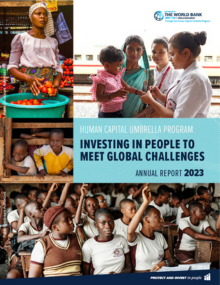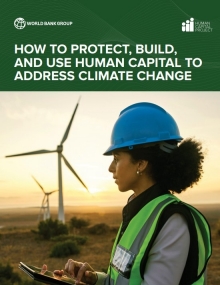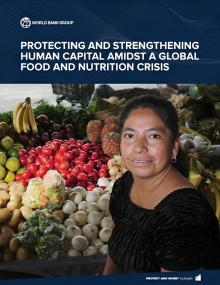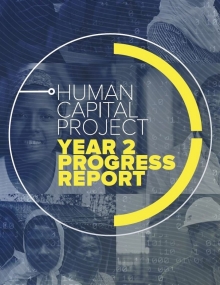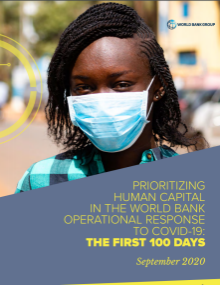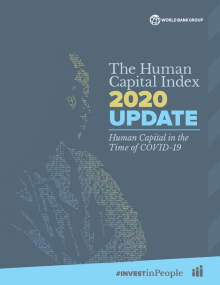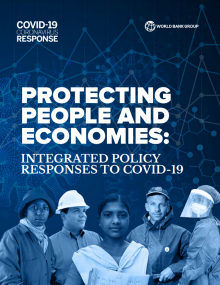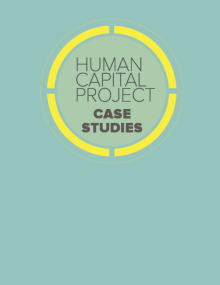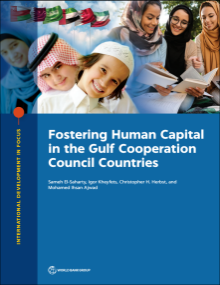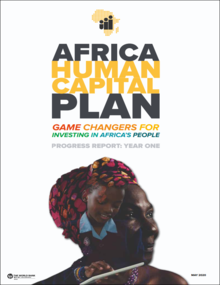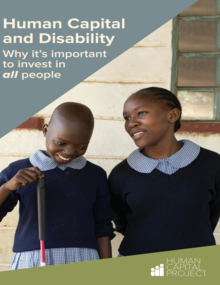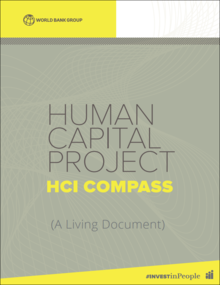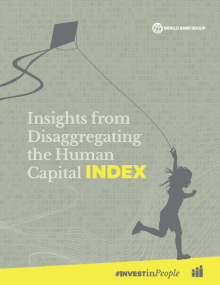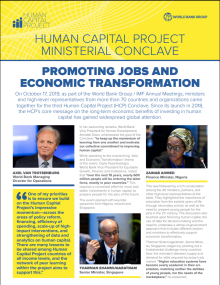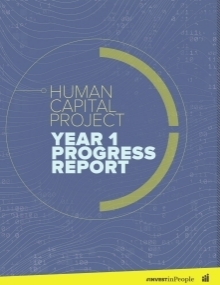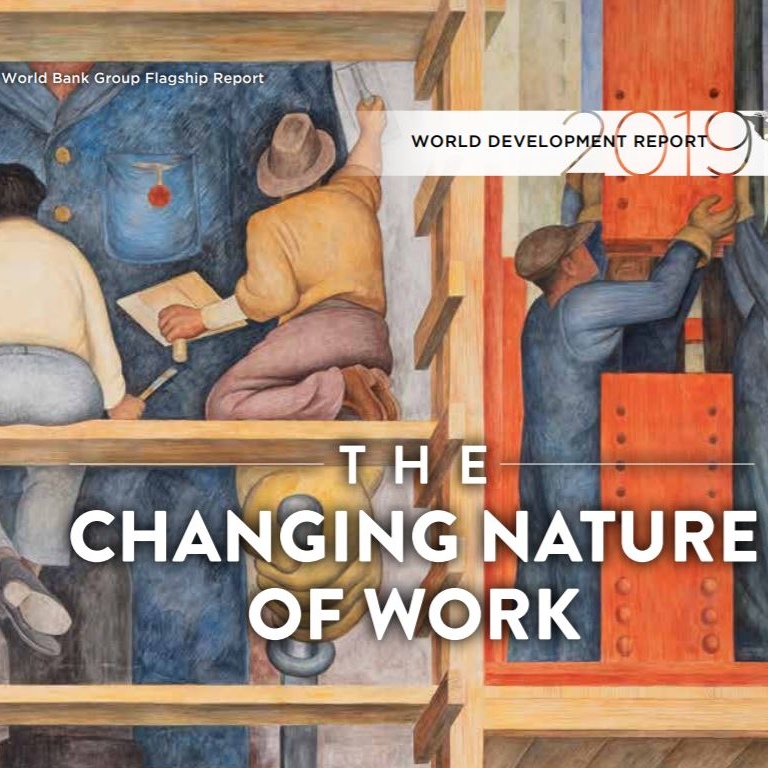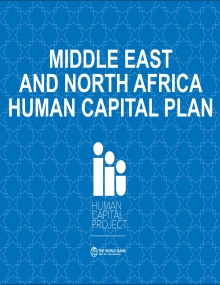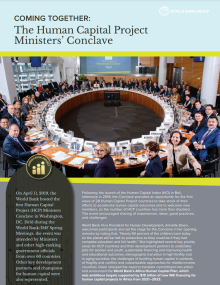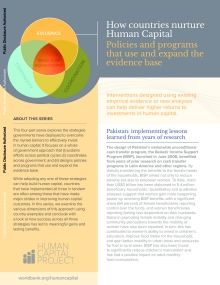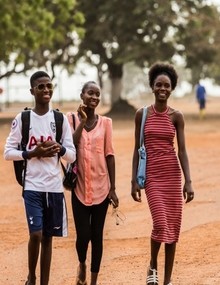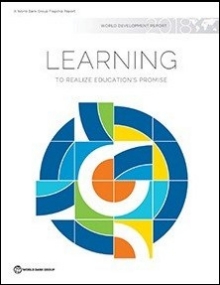The Human Capital Project (HCP) is providing innovative ways for countries to protect and invest in their people. Produced through careful analysis, strategic thinking, and partnerships, the HCP is proud to share a variety of core documents that help country governments to engage in this important agenda.
Human Capital Project: Key Reports
Human Capital Umbrella Program Annual Report 2023
Supported by the Bill & Melinda Gates Foundation and Government of Canada, the Human Capital Umbrella Program serves as a catalyst for accelerating investments in people. The Program continued to advance its work through a whole-of-government approach to support evidence-based initiatives across sectors to foster lasting social and economic transformation. Through analytical work and strategic initiatives, the program influences project design and implementation to effectively advance human capital outcomes.
How to Protect, Build, and Use Human Capital to Address Climate Change
Climate change is a direct threat to human capital. At the same time, human capital empowers people to advocate for climate action and to pioneer the technology for a net-zero-emissions future. Read to learn the impacts of climate change on people and how to protect, build, and use human capital to ensure a livable planet.
Human Capital Umbrella Program Annual Report 2022
The 2022 Annual Report highlights program results in 18 countries in Africa and South Asia. The Umbrella Program mainstreams and embeds a human capital approach to development, and collectively addresses challenges through multisectoral action—a ‘whole-of-government’ approach—yielding results at scale in high priority countries and globally.
Protecting and Strengthening Human Capital Amidst a Global Food and Nutrition Crisis
How can countries ensure resilience in the face of growing food and nutritional crises? What implications do these crises have on children, and how can they be abated? Find out more by reading the report. Keywords: high food prices, food shortages, supply chain disruption, food insecurity, vulnerability.
Human Capital Investments in Türkiye
Next-Generation Human Capital Investments for Inclusive Jobs.
The aim of this policy note is to examine the relative efficiency and equity of public expenditures and policies for human capital and labor markets over the past decade in Türkiye in preparing for a post-COVID, inclusive, green transition.
The African Human Capital Plan Year Three Progress Report: Putting People First
Launched in April 2019, the African Human Capital Plan (HCP) focuses on prioritizing investments in critical social sectors to improve Africa's human capital outcomes and economic growth. As we take on COVID-19, climate change, and other compounding crises that threaten to erode the human capital of an entire generation, the African HCP provides a strong framework to address emergency response and inclusive recovery efforts.
Human Capital Ministerial Conclave
On April 26th, 2022, Ministers of finance and planning, private sector leaders, and heads of foundations and agencies from over 60 countries joined the 2022 Spring Meetings Human Capital Ministerial Conclave to discuss policy priorities and solutions to overcome learning losses and restore jobs and skills.
Human Capital Umbrella Program Annual Report 2021
This annual report details the activities of the Human Capital Umbrella Program and its anchor trust fund, the Advancing Human Capital Outcomes Globally Multi-Donor Trust Fund (MDTF), with operational and financial reporting as of December 2021.
Human Capital Project Year 3 Report
This report highlights the challenges and successes countries have experienced over the past year. It acknowledges that countries have struggled to stem their losses with the impact of the Corona virus on lives and livelihoods. Countries continue to invest in their people, for resilient and inclusive development, supported by the Human Capital Project.
Human Capital Ministerial Conclave
This brief summarizes the proceedings of the Human capital ministerial conclave event 2021. The conclave covered three main themes: Scalability of service delivery, Efficiency of spending on human capital and Equity which puts people at the center of development.
Building Human Capital in Ireland
This case study looks at the story of Ireland’s remarkable economic and social transformations since the 1960s, with a focus on the contribution made by education to human capital development. The people of Ireland are armed with the relevant knowledge, entrepreneurial agility, and analytical skills to support economic and social prosperity.
Investing in Human Capital for a Resilient Recovery: The role of public finance
The Approach Paper considers the role of public finance to build, protect and utilize human capital as well as lay a foundation for inclusive, resilient and sustainable development. The paper defines the problem with respect to human capital outcomes amid the COVID-19 crisis and outlines three areas for action, including policy priorities, governance, and utilizing human capital.
Technology and Human Capital in South Asia
This report looks at how South Asia could capitalize on technologies to accelerate human capital development and promote adaptability and resilience to future shocks. These breakthroughs can improve service delivery, productivity, and innovation, but they can also exacerbate inequalities and eliminate people’s agency and empowerment.
Africa Human Capital Plan (Year 2)
This progress report, highlights how the World Bank has supported countries in Africa to weather the COVID-19 pandemic. It is a story of speed, scale, and ambition and an enduring commitment to investing in Africa’s people.
Children: The Hidden Pandemic 2021
This report presents statistical data from 192 countries on children experiencing COVID-19-associated orphanhood and death of grandparent caregivers. The report demonstrates that protecting children from the dire, potentially irreversible threats of this health emergency demands both immediate and sustained action at all levels.
Human Capital Project Ministerial Conclave : Investing in Human Capital for a Green, Resilient and Inclusive Recovery
On April 5, 2021, ministers of finance and planning, together with high-level government officials and development partners from the 81 HCP member countries, participated in the Human Capital Project Ministerial Conclave to discuss the importance of investing in human capital for a green, resilient and inclusive recovery from the COVID-19 crisis.
Human Capital Project : Year 2 Progress Report
The Human Capital Project has completed its second official year of activities. This report describes new tools, networks, knowledge-sharing, and operations helping ensure we #investinpeople.
Human Capital Ministerial Conclave
At the 2020 Annual Meetings Human Capital Ministerial Conclave, speakers shared unique views around; Mobilizing finance to protect and invest in human capital in response to Covid-19; Prioritizing expenditures and generating efficiencies within a limited fiscal space, and Deploying innovative solutions to protect human capital outcomes and close equity gaps.
The First 100 Days: Prioritizing People in the COVID Response
In the first 100 days of the COVID-19 operational response the World Bank has leveraged over $16 billion in funding for human capital priorities. These resources are supporting more than 100 governments to save lives, safeguard the poor and vulnerable, protect jobs, and rebuild better systems for the future.
The Human Capital Index 2020 Update : Human Capital in the Time of COVID-19
This report presents an update to the Human Capital Index (HCI), using the most recent health and education data available as of 2020. It documents new evidence on trends over time in the HCI, examples of success, and new analytical work on utilization of human capital, as well as a primer on the COVID-19 (coronavirus) pandemic and its potential impact on human capital.
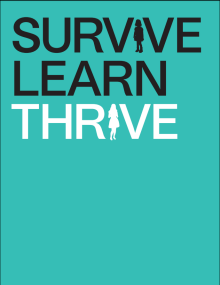
Survive, Learn, Thrive : Strategic Human Capital Investments
Human capital is the stock of accumulated knowledge, experience, and attributes that workers bring to and use in the production of goods and services in an economy. Investing in people through quality healthcare, education, social services, and job opportunities develops human capital, which is key to ending extreme poverty and creating more inclusive societies. [Armenia, Azerbaijan, Georgia]
Protecting People and Economies : Integrated Policy Responses to COVID-19
This report proposes several principles that can inform policy decisions when responding to the many challenges brought on by the COVID-19 pandemic. Written with contributions across the entire World Bank, it sketches possible solutions for containing the pandemic and protecting health, for protecting human capital and livelihoods and for safeguarding the economy.
Human Capital Project Case Studies Series (July 21, 2020)
The Human Capital Project is supporting a variety of case studies that examine the policies, programs and practices that governments have used to achieve their human capital goals and on identifying lessons for other countries.
Fostering Human Capital in the Gulf Cooperation Council Countries (June 19, 2020)
The formation of human capital--the knowledge, skills, and health that people accumulate over their lifetimes--is critical for the six Gulf Cooperation Council (GCC) countries. Human capital contributes not only to human development and employment but also to the long-term sustainability of a diversified economic growth model that is knowledge based and private sector driven.
Africa Human Capital Plan Year One Progress Report : Game Changers for Investing in Africa's People (June 1, 2020)
In April 2019, we launched the Africa Human Capital Plan. This ambitious plan sets out clear targets and commitments to boost Africa's potential through its human capital. After just one year, the plan is well underway, helping African countries build momentum by leveraging investments and policy reforms across key sectors, empowering women, developing solutions tailored to the challenges of fragile and conflict-affected settings, mobilizing technology and innovation, and building knowledge and partnerships.
Human Capital and Disability : Why It's Important to Invest in All People (May 26, 2020)
The Human Capital project is predicated on the importance of investing in all people. This brief outlines the barriers faced by persons with disabilities at different points in the lifecycle as they strive to purse their human capital goals. It describes the whole-of-government approach needed for disability inclusive development to take place and outlines what the World Bank will do to support action now.
Human Capital Project : HCI Compass (April 27, 2020)
The Human Capital Index (HCI) Compass is a guidance note for clients' own assessment of progress towards HCI. The launch of the Human Capital Index (HCI) in October 2018 spurred an interesting conversation on the state of the world in terms of preparing the current generation to the challenges of the future labor market.
The Human Capital Project and Climate (May 1, 2020)
Human capital can play an important role in reducing greenhouse gas (GHG) emissions, generating long-term human development gains. Actions to cut GHG emissions can lower air pollution, the fourth-leading risk factor for death worldwide largely affecting children. Low-carbon and resilient growth could deliver economic benefits of 26 trillion US Dollars by 2030. The Human Capital Project can support this shift to a new climate economy.
Insights from Disaggregating the Human Capital Index (January 3, 2020)
This report quantifies inequalities in human capital and particularly focuses on socioeconomic and subnational spatial differences. The authors discuss 50 low- and middle-income countries with comparable data and highlight the potential of detailed disaggregation for the design of well-targeted policies.
Human Capital Project Ministerial Conclave : Promoting Jobs and Economic Transformation (October 17, 2019)
On October 17, 2019, as part of the World Bank Group and International Monetary Fund (IMF) annual meetings, ministers and high-level representatives from more than 70 countries and organizations came together for the third Human Capital Project (HCP) conclave, with a focus on how human capital investments benefit job opportunities and economic transformation.
HCP : 2019 Annual Progress Report (October 3, 2019)
Read what countries have accomplished during the first full year of the HCP.
The Changing Nature of Work (World Development Report 2019) (October 1, 2019)
Fears that robots will take away jobs from people have dominated the discussion over the future of work, but the World Development Report 2019 finds that on balance this appears to be unfounded. This report suggests investments in human capital and social protection can lead the way to the skills needed in a changing labor market.
Middle East and North Africa Human Capital Plan (October 3, 2019)
On October 16, 2019, The World Bank launched a new plan for MENA countries to invest in human capital by focusing on early childhood development and improving learning outcomes.
The Human Capital Project Ministers’ Conclave (April 11, 2019)
On April 11, 2019, the World Bank hosted the first Human Capital Project (HCP) Ministers Conclave in Washington, DC. Held during the World Bank/IMF Spring Meetings, the event was attended by Ministers and other high-ranking government officials from over 60 countries. Other key development partners and champions for human capital were also represented.
Whole-of-Government Series (April 1, 2019)
This series of four briefs explores strategies that governments have deployed to overcome barriers to investing in human capital: (i) sustaining effort across political cycles, (ii) coordinating across government, and (iii) designing policies according to evidence. (iv) whole of government approach.
The Human Capital Project in Sub-Saharan Africa: Stories of progress (October 1, 2018)
Investing in Africa’s people is central to ensuring the continent’s future prosperity and full participation in global markets. This overview explains how some countries in Africa have already advanced the agenda and what the Human Capital Project will do to support outcomes.
The Human Capital Project Brief (August 7, 2018)
This brief provides a definition of human capital, describes the HCP goals and theory of change, and presents evidence of the importance of investing in people, economies, and societies. The HCI methodology is detailed in the appendix.
Learning to Realize Education’s Promise (World Development Report 2018)
The best way to equip children and youth for the future is to place their learning at the center the education system. The 2018 World Development Report explores four main themes: 1) education’s promise; 2) the need to shine a light on learning; 3) how to make schools work for learners; and 4) how to make systems work for learning.
